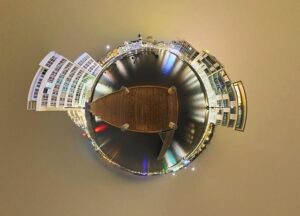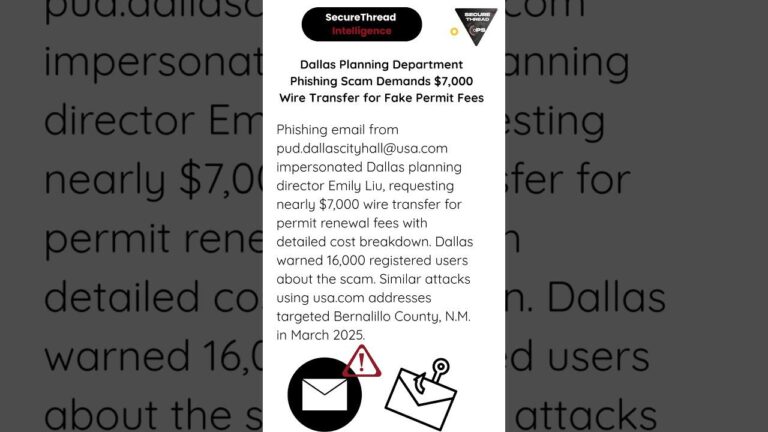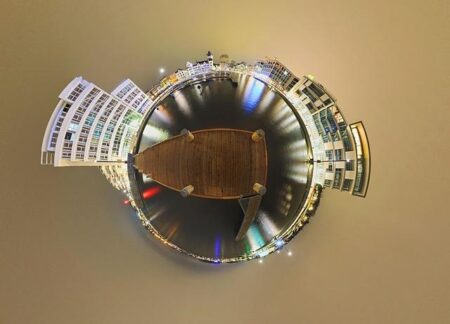Dallas Residents Face Sophisticated Email Scams Masquerading as City Planning Department
A surge of deceptive emails has recently been reported by Dallas homeowners and businesses, falsely claiming to originate from the city’s Planning and Urban Development Department. These fraudulent communications demand large sums—often thousands of dollars—allegedly for permit fees or zoning approvals. Crafted with official logos and technical language, these emails aim to intimidate recipients into making immediate payments by threatening project delays or legal consequences. City officials strongly advise verifying any such payment requests through authorized channels to avoid falling prey to these scams.
To safeguard against these fraudulent attempts, the City of Dallas recommends the following precautions:
- Avoid opening attachments or clicking links from unknown or suspicious emails.
- Confirm payment demands by contacting the Planning Department using verified phone numbers or email addresses.
- Be cautious of unsolicited emails that pressure for immediate fees.
- Report any suspicious correspondence to city authorities and local law enforcement promptly.
| Warning Sign | Recommended Action |
|---|---|
| Unknown or suspicious sender | Check if the email domain matches official Dallas city domains |
| Unexpected high fee requests | Verify against official city permit fee schedules |
| Urgent payment deadlines | Do not rush; confirm legitimacy through direct contact |
| Attachments or links | Only open if sender authenticity is confirmed |
Understanding the Scam Tactics and How They Are Identified
Cybercriminals impersonate Dallas city planning officials by dispatching highly convincing emails that demand thousands of dollars for supposed permits or zoning services. These messages create a false sense of urgency, pressuring recipients to pay quickly to avoid project interruptions or legal repercussions. The emails often feature authentic-looking city logos, official terminology, and fabricated contact details that closely resemble legitimate city communication channels. Common scam strategies include:
- Imposing tight deadlines for fee submission
- Using authoritative titles and referencing official documents
- Requesting payments via wire transfers or prepaid gift cards
- Threatening project delays or legal action if fees are not paid
Dallas city IT teams and cybersecurity specialists employ advanced detection techniques to intercept these scams before they cause harm. Key red flags include suspicious sender email addresses, inconsistent formatting, and demands for untraceable payment methods. The city’s cybersecurity infrastructure utilizes pattern recognition algorithms and email filtering software to identify and block fraudulent messages. The table below contrasts typical scam email features with those of authentic Dallas Planning Department communications:
| Characteristic | Fraudulent Email | Official Email |
|---|---|---|
| Sender Email Domain | Unfamiliar or misspelled domains | Ends with @dallascityhall.com |
| Communication Tone | Pressuring and urgent | Clear, professional, and informative |
| Payment Instructions | Wire transfers or prepaid cards | Secure city payment portals |
| Contact Information | Fake phone numbers or email addresses | Verified city department contacts |
Official Recommendations for Confirming Authentic Dallas Planning Department Communications
In response to the rise in fraudulent emails, Dallas city officials have issued a public alert urging residents and businesses to exercise caution. These scam emails falsely demand thousands of dollars for permits or planning approvals, exploiting the trust of the community. The city clarifies that any legitimate fee requests will always be preceded by verifiable communication through official channels.
To help residents identify genuine correspondence, the city advises the following verification steps:
- Check the sender’s email address: Authentic emails will have domains ending with
@dallascityhall.com. - Reach out directly to the Planning Department: Use contact details listed on the official Dallas city website.
- Refrain from clicking on suspicious links or downloading attachments.
- Confirm payment requests: All official fees are processed through secure, recognized city payment systems.
| Verification Step | What to Confirm |
|---|---|
| Email Domain | Must end with @dallascityhall.com |
| Phone Number | Use only numbers listed on the official city website |
| Payment Method | Verify through the city’s secure online payment portal |
How to Protect Yourself and Report Suspicious Emails in Dallas
When you receive emails claiming to be from the Dallas Planning Department, scrutinize the sender’s email address carefully. Fraudulent emails often come from unofficial domains or use subtle misspellings to mimic legitimate addresses. Never respond to payment requests or share personal and financial details without first confirming the message’s authenticity through official city contacts. Always use the contact information provided on the official Dallas government website to verify any fee demands.
If you suspect an email is fraudulent, report it immediately to help protect others in the community. Dallas residents can forward suspicious emails to the city’s dedicated fraud hotline as well as the Federal Trade Commission. The table below outlines the appropriate steps and contacts for reporting:
| Action | Contact | Information to Provide |
|---|---|---|
| Report Suspicious Email | Dallas Fraud Hotline | Email headers, sender address, message content |
| File a Complaint | Federal Trade Commission (FTC) | Copy of the email, payment requests, date and time received |
| Verify Official Communication | Dallas Planning Department | Use official phone numbers or website contact forms |
- Be wary of urgent payment demands that pressure you to act immediately to avoid penalties.
- Enable multi-factor authentication (MFA) on your email accounts to add an extra layer of security.
- Regularly update your passwords and avoid reusing credentials across multiple platforms.
Final Thoughts: Staying Alert Against Dallas Planning Department Email Frauds
As investigations into this ongoing scam continue, Dallas residents and businesses are urged to remain cautious and verify any unexpected communications claiming to be from the city’s planning department. The Dallas News will provide timely updates and practical advice to help protect personal and financial information from these deceptive schemes. For the latest information and resources, visit the official Dallas city website and report any suspicious emails to local authorities without delay.







